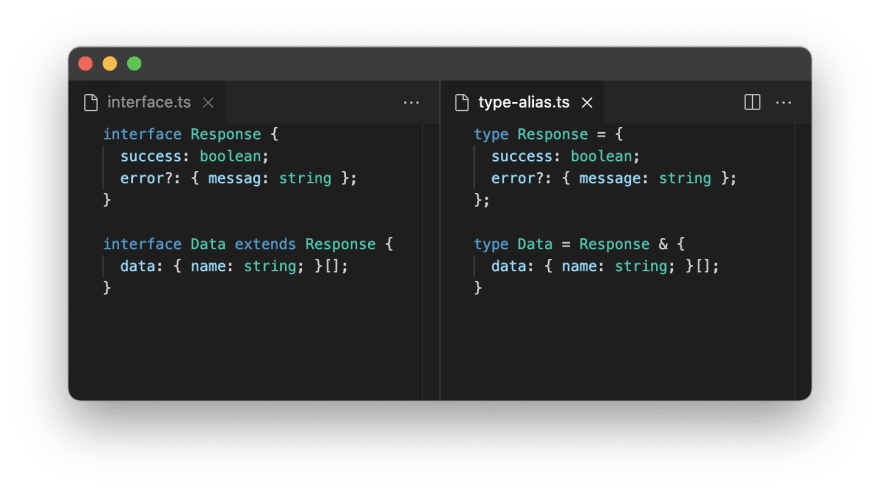26
Interface vs Type Alias in TypeScript—Quick Comparison
This can be confusing for anyone working with TypeScript—beginner or seasoned programmer. Both ways can cover similar needs.
In this post you’ll quickly see what Typescript feature is possible to implement as Type Alias or Interface. I stayed brief and spicy to give the post an overview character.
👉 TLDR: You don’t care about each difference? What should you use?
Use interface until you need type
—orta
| Feature | I | T | Example |
|---|---|---|---|
| Primitives | ❌ | ✅ | type UUID = string |
| Extend / Intersect | ✅ | ✅ | Response & ErrorHandling |
| Unions | ❌ | ✅ | string | number |
| Mapped object types | ❌ | ✅ | ['apple' | 'orange']: number |
| Augment existing types | ✅ | ❌ | declare global { interface Window { … } } |
| Declare type with typeof | ❌ | ✅ | Response = typeof ReturnType<fetch> |
| Tuples | ✅ | ✅ | [string, number] |
| Functions | ✅ | ✅ | (x: number, y: number): void |
| Recursion | ✅ | ✅ | Nested { children?: Nested[] } |
❌: Interface
✅: Type Alias
✅: Type Alias
string, number and boolean make up the Primitives in Typescript.
✅: Interface
✅: Type Alias
✅: Type Alias
Although intersect and extend are not 100% the same for interface and type alias, I put them together in this example. The differences arise when type keys appear in both types that you want to extend or intersect from.
So if the extended or intersected key is not the same type:
never

❌: Interface
✅: Type Alias
✅: Type Alias
Type the keys in your objects with this.
Here are a few useful applications of this:
[key: string]: only strings as key allowed[key: number]: only numbers as key allowed[key in keyof T as `get${Capitalize<string & key>}`]: only allow keys that start with get..., e.g. as seen in a Getter object
❌: Interface
✅: Type Alias
✅: Type Alias
Typescript’s equivalent to
OR: The type is either x or y or z or as many as you want.
✅: Interface
❌: Type Alias
❌: Type Alias
You can add fields to already existing types. It’s useful when you add a new field (e.g.
jQuery library for auto completion) onto an existing type (e.g. window).
✅: Interface
✅: Type Alias
✅: Type Alias
If you’ve used hooks in react, then you know the usefulness of tuples.
A single function call can return an array of values and functions, that are destructured and can be used as fully typed variables:
const [name, setName] = useState('')
✅: Interface
✅: Type Alias
✅: Type Alias
Functions can be annotated with Parameter Types and Return Types.

✅: Interface
✅: Type Alias
✅: Type Alias
Recursion are simple to use. Make sure you add the optional
? to the recursive property. Otherwise the TS compiler spits out an error upon searching an endless recursion.
Simon Wicki is a Frontend Developer in Berlin. Passionate and fluent in Vue, Angular, React and Ionic. Interested in Tech, frontend, web perf & non-fiction books.
26
